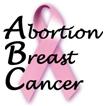Abortion-Breast Cancer Statistics Far Worse Than Reported
The Coalition on Abortion/Breast Cancer, an international women’s organization, announced today that the abortion-breast cancer statistics provided in a press release on October 2, 2001 by Concerned Women For America (CWA) are really far worse than what had been reported.
Mrs. Karen Malec, president of the Coalition on Abortion/Breast Cancer, said: “We are extremely grateful to CWA for having expressed its concern to the national media about the research which has linked abortion with breast cancer over the last 44 years. However as of this date, 28 out of 37 worldwide studies published since 1957 have shown a positive association between abortion and breast cancer. Seventeen studies are statistically significant, 16 of which found increased risk. A 1996 review and meta-analysis of 23 studies determined that 18 studies found increased risk."
The review reported a 30% increased risk for the general population.” 1
Mrs. Malec added that,
“October is Breast Cancer Awareness Month. We sincerely hope that the media will inform women of all of the risk factors for breast cancer this month, including abortion. Our teenagers are especially at grave risk for breast cancer when they procure abortions. Dr. Janet Daling and her colleagues determined in their 1994 study commissioned by the National Cancer Institute that women who have abortions before the age of 18 more than double their risk of breast cancer. Even more ominously, individuals in this group have an incalculably high risk of breast cancer if they procure abortions and have a family history of the disease. In the Daling study, all 12 women with these characteristics were diagnosed with breast cancer by the age of 45.” 2
A medical text entitled, The Breast, and the 1988 Henderson lecture published in the journal, Cancer Research, acknowledge the link between abortion and breast cancer. The medical text discusses the causes of breast cancer and states that exposure of the breasts to estrogen for long periods of time proportionately increases breast cancer risk. It specifically identifies abortion as a risk factor. It says, “Long-term exposure to endogenous estrogens (early menarche; late menopause; late age at first full-term pregnancy; and being overweight, leading to increased aromatization of circulating androgens to estrogens) appears to increase cancer risk. Risk is decreased with early menopause (natural or artificial) and childbearing. However, first-trimester abortion increases risk.” 3
The medical text cited the Henderson lecture to support its statement that
“first-trimester abortion increases risk.” Henderson said, “Recently, we found that a first-trimester abortion, whether spontaneous or induced, before the first full-term pregnancy is actually associated with an increase in the risk of breast cancer.” 4
The Henderson statement asserting that abortion is linked with increased breast cancer risk was based on only two studies, the first of which Henderson co-authored and was the first American study. 5
The Coalition on Abortion/Breast Cancer is an international women’s organization founded to protect the health and save the lives of women by educating and providing information on abortion as a risk factor for breast cancer.
- 1. Brind et al. (1996) J Epidemiol Community Health 50:481-96
- 2. Daling et al. (1994) J Natl Cancer Inst 86:1584-92
- 3. Robert B. Dickson, Ph.D., Marc E. Lippman, M.D., “Growth Regulation of Normal and Malignant Breast Epithelium,” The Breast: Comprehensive Management of Benign and Malignant Diseases, edited by Kirby I. Bland, M.D. and Edward M. Copeland III, M.D.; (1998) W. B. Saunders Company; 2nd edition; Vol. 1, p. 519
- 4. Henderson, B.E., Ross, R., Bernstein, L.; “Estrogens as a cause of human cancer,” The Richard and Hinda Rosenthal Foundation Award Lecture, University of Southern California School of Medicine, Los Angeles, California; Cancer Res 48:246-253, 1988
- 5. Pike, M.C., Henderson, B.E., Casagrande, J.T., et al. “Oral contraceptive use and early abortion as risk factors for breast cancer in young women,” Br. J. Cancer (1981) 43: 72-76; and Hadjimichael, O.C., Boyle, C.A., and Meigs, J.W. “Abortion before first live birth and risk of breast cancer,” Br. J. Cancer (1986) 53:281-284

